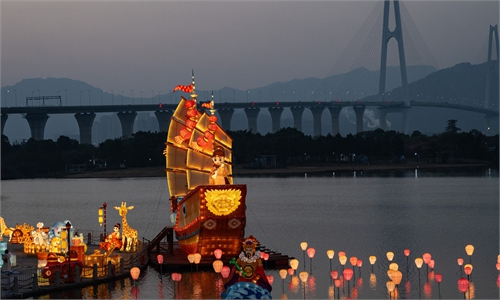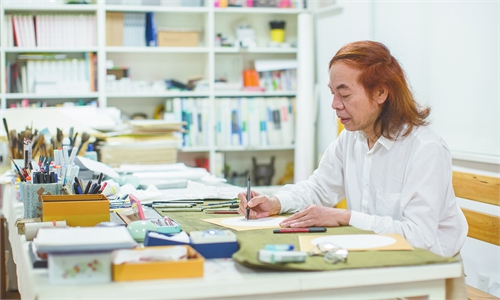
The Emperor Yan Mausoleum in Gaoping, North China's Shanxi Province Photo: VCG
"I come from the hometown of Emperor Yan, the divine farmer. It is also the spiritual origin of Chinese people around the world," Lee Yen-tsen, a 75-year-old compatriot from the island of Taiwan whose ancestral roots trace back to Shandong Province, told the Global Times on Tuesday after participating in the 10th cross-Straits civil exchange event at Emperor Yan's birthplace in the city of Gaoping, North China's Shanxi Province.
Held at the Emperor Yan Mausoleum on Monday, the ceremony brought together local residents, compatriots from Taiwan island and overseas Chinese, all of whom gathered in reverence for the common ancestor of the Chinese nation.
The rite unfolded with traditional grandeur - resounding ceremonial bells and drums, floral tributes, incense offerings, ritual readings, bowing ceremonies and a stately dance performance paying homage to the legendary emperor.
At the same time, temples dedicated to Emperor Yan in Taiwan island held parallel rituals, underscoring the deep spiritual ties across the Taiwan Straits.
With its rich legacy of historical relics and a well-preserved cultural system, Gaoping has long been recognized as the ancestral home of Emperor Yan. In recent years, the local government has worked hard to preserve and promote this heritage, making the cross-Straits exchange event an annual platform for shared cultural remembrance.
Lee Chi-szu, 81, who was born in Shanxi's Jiaocheng county, moved to Taiwan island at the age of 3. With three sisters residing in the Chinese mainland, Lee has been visiting the mainland nearly every year since the 1980s.
"Every time I come back, I see the homeland growing stronger," he said, per the China News Service. This marked his second visit to the Emperor Yan Mausoleum for ancestral worship. "This journey is about seeking our roots. One must never forget where they come from."
Another Taiwan compatriot, 75-year-old Lee Chin-lin, originally from Lingqiu county in Shanxi, expressed similar sentiments. "Coming to Shanxi to pay tribute to the Emperor Yan is a return to my roots - I have a deep affection for my homeland," he said.
A representative from the Gaoping Emperor Yan Cultural Research Association, one of the event's organizers, told the Global Times on Tuesday that the program extended beyond ancestral rites.
From Sunday to Tuesday, visiting participants engaged in local cultural exchange activities featuring intangible cultural heritage demonstrations, scientific exploration programs and folk traditions.
According to the organizers, as Emperor Yan, believed to have pioneered agriculture and medicine in ancient China, remains a revered symbol of unity and common ancestry, events like this continue to serve as vital bridges linking communities on both sides of the Taiwan Straits with their shared heritage and future.
"Shanxi, as the birthplace of Emperor Yan, holds a central place in that identity," Liu Zheng, a member of the Chinese Society of Cultural Relics, told the Global Times.
"Especially with the recent archaeological findings at the Taosi ruins, we now have stronger evidence to support the historical existence of Emperor Yan. This solidifies China's more than 5,000 years of civilization."
He noted that many technological and cultural developments in Chinese civilization trace back to the legendary deeds of Emperor Yan.
"The story of Shennong [Emperor Yan] tasting hundreds of herbs and his association with traditional Chinese medicine is not just myth - it's a cultural memory that still shapes our practices today."
There are also deep historical ties between Taiwan island and Shanxi Province. Liu noted that following population loss during the early Ming Dynasty (1368-1644), waves of migrants were registered in Shanxi's Hongtong county, and then dispatched across China, including to Fujian and Guangdong provinces - before some ultimately settled on Taiwan island during the Qing Dynasty (1644-1911).
"So in many ways, Shanxi is the ancestral homeland of these descendants. Reviving cultural exchanges such as this one are not only meaningful but necessary to restore a shared memory that has been interrupted," Liu said.



